Unit 10 You’re supposed to shake hands 单元巩固与复习 课件(共29张PPT)
文档属性
| 名称 | Unit 10 You’re supposed to shake hands 单元巩固与复习 课件(共29张PPT) |  | |
| 格式 | zip | ||
| 文件大小 | 18.6MB | ||
| 资源类型 | 教案 | ||
| 版本资源 | 人教新目标(Go for it)版 | ||
| 科目 | 英语 | ||
| 更新时间 | 2020-06-19 16:56:47 | ||
图片预览

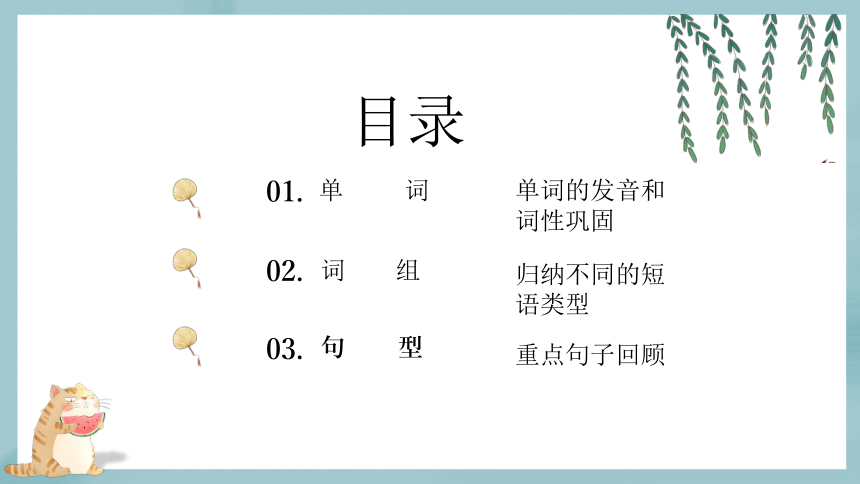

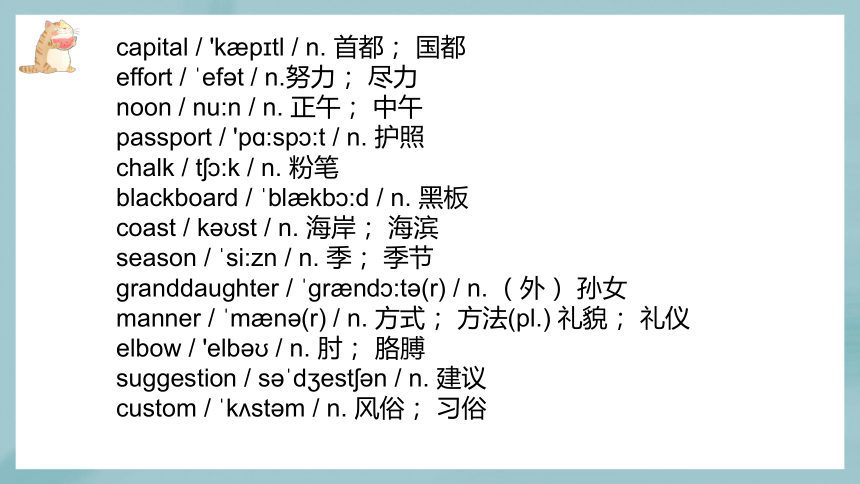
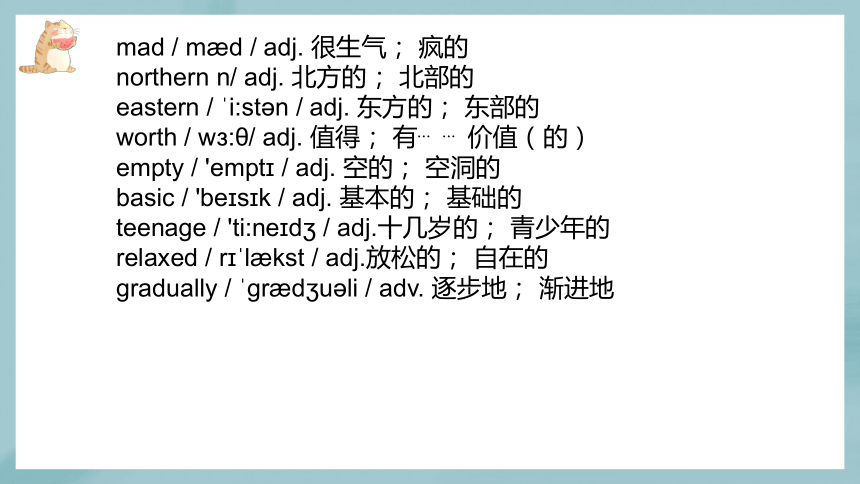
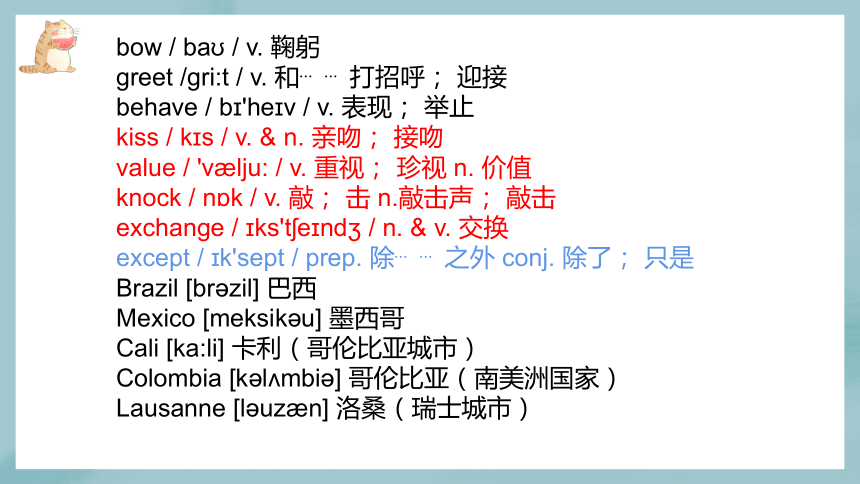
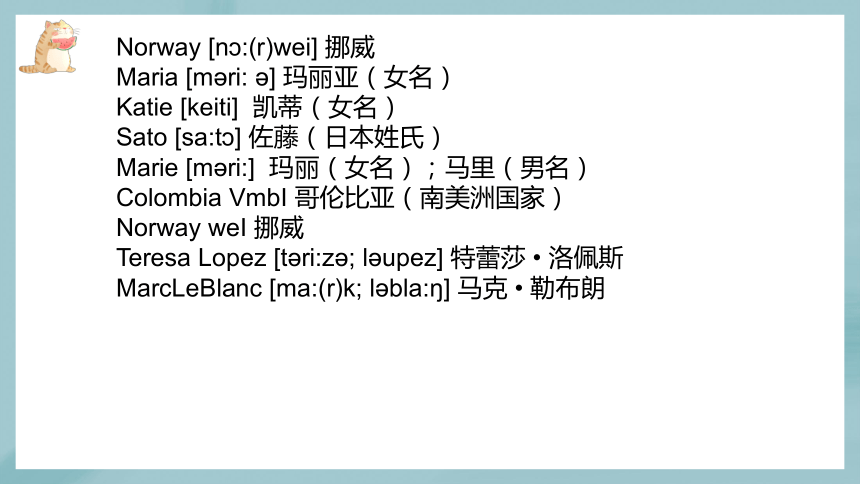

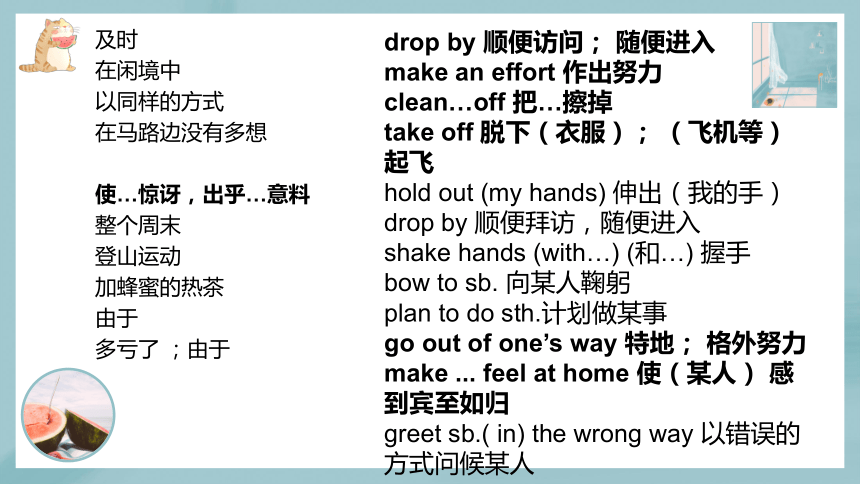
文档简介
(共29张PPT)
Unit
10
You're
supposed
to
shake
hands.
目录
单词
01.
词组
02.
句型
03.
单词的发音和词性巩固
归纳不同的短语类型
重点句子回顾
单词发音与词性
壹
capital
/
'k?p?tl
/
n.
首都;
国都
effort
/
?ef?t
/
n.努力;
尽力
noon
/
nu:n
/
n.
正午;
中午
passport
/
'pɑ:sp?:t
/
n.
护照
chalk
/
t??:k
/
n.
粉笔
blackboard
/
?bl?kb?:d
/
n.
黑板
coast
/
k??st
/
n.
海岸;
海滨
season
/
?si:zn
/
n.
季;
季节
granddaughter
/
?gr?nd?:t?(r)
/
n.
(外)
孙女
manner
/
?m?n?(r)
/
n.
方式;
方法(pl.)
礼貌;
礼仪
elbow
/
'elb??
/
n.
肘;
胳膊
suggestion
/
s??d?est??n
/
n.
建议
custom
/
?k?st?m
/
n.
风俗;
习俗
mad
/
m?d
/
adj.
很生气;
疯的
northern
n/
adj.
北方的;
北部的
eastern
/
?i:st?n
/
adj.
东方的;
东部的
worth
/
w?:θ/
adj.
值得;
有??价值(的)
empty
/
'empt?
/
adj.
空的;
空洞的
basic
/
'be?s?k
/
adj.
基本的;
基础的
teenage
/
'ti:ne?d?
/
adj.十几岁的;
青少年的
relaxed
/
r??l?kst
/
adj.放松的;
自在的
gradually
/
?gr?d?u?li
/
adv.
逐步地;
渐进地
bow
/
ba?
/
v.
鞠躬
greet
/ɡri:t
/
v.
和??打招呼;
迎接
behave
/
b?'he?v
/
v.
表现;
举止
kiss
/
k?s
/
v.
&
n.
亲吻;
接吻
value
/
'v?lju:
/
v.
重视;
珍视
n.
价值
knock
/
n?k
/
v.
敲;
击
n.敲击声;
敲击
exchange
/
?ks't?e?nd?
/
n.
&
v.
交换
except
/
?k'sept
/
prep.
除??之外
conj.
除了;
只是
Brazil
[br?zil]
巴西
Mexico
[meksik?u]
墨西哥
Cali
[ka:li]
卡利(哥伦比亚城市)
Colombia
[k?l?mbi?]
哥伦比亚(南美洲国家)
Lausanne
[l?uz?n]
洛桑(瑞士城市)
Norway
[n?:(r)wei]
挪威
Maria
[m?ri:
?]
玛丽亚(女名)
Katie
[keiti]
凯蒂(女名)
Sato
[sa:t?]
佐藤(日本姓氏)
Marie
[m?ri:]
玛丽(女名);马里(男名)
Colombia
VmbI
哥伦比亚(南美洲国家)
Norway
weI
挪威
Teresa
Lopez
[t?ri:z?;
l?upez]
特蕾莎
?
洛佩斯
MarcLeBlanc
[ma:(r)k;
l?bla:?]
马克
?
勒布朗
词组巩固
贰
及时
在闲境中
以同样的方式
在马路边没有多想
使…惊讶,出乎…意料
整个周末
登山运动
加蜂蜜的热茶
由于
多亏了
;由于
drop
by
顺便访问;
随便进入
make
an
effort
作出努力
clean…off
把…擦掉
take
off
脱下(衣服);
(飞机等)
起飞
hold
out
(my
hands)
伸出(我的手)
drop
by
顺便拜访,随便进入
shake
hands
(with…)
(和…)
握手
bow
to
sb.
向某人鞠躬
plan
to
do
sth.计划做某事
go
out
of
one’s
way
特地;
格外努力
make
...
feel
at
home
使(某人)
感到宾至如归
greet
sb.(
in)
the
wrong
way
以错误的方式问候某人
及时
在闲境中
以同样的方式
在马路边没有多想
使…惊讶,出乎…意料
整个周末
登山运动
加蜂蜜的热茶
由于
多亏了
;由于
greet
sb.(
in)
the
wrong
way
以错误的方式问候某人
welcome
party
欢迎会
value
the
time
we
spend
with
sb珍惜我们与某人度过的时间
make
plans
(
to
do
sth.)
计划做某事
after
all
毕竟;
终归
for
the
first
time
首次,第一次
people
in
Korea
韩国的人们
as
soon
as
一…
就…...(引导时间状从)
as
soon
as
sb
can
尽可能快的......
on
both
sides
of
my
face在我的两个脸颊上
及时
在闲境中
以同样的方式
在马路边没有多想
使…惊讶,出乎…意料
整个周末
登山运动
加蜂蜜的热茶
由于
多亏了
;由于
a
bit/
little
late
晚一点
in
our
everyday
lives
在我们的日常生活中
on
the
side
of
the
face在脸的一侧
the
town
center
在城镇中心
as
many
as
sb
can
=
as
many
as
possible
尽可能多的…
the
capital
of
clocks
and
watches钟表之都
at
noon
在中午
15
minutes
late
迟到15分钟
及时
在闲境中
以同样的方式
在马路边没有多想
使…惊讶,出乎…意料
整个周末
登山运动
加蜂蜜的热茶
由于
多亏了
;由于
be
supposed
to
do
sth
应该做…
be
expected
to
do
sth.
应该/被期望做…
get
mad
大动肝火;
气愤
get
used
to
习惯于
be
invited
to
sw.
被邀请去…...
be
invited
to
do
sth.
被邀请做…
be
from=
come
from
来自
be
relaxed
about
对…放松/随意
be
on
time
守时
句子巩固
叁
1.他本应该把这件事告诉我。
He
should
have
told
me
about
it.
2.
我所在的地方,对时间是相当宽松的。
Where
I’m
from,
we’re
pretty
relaxed
about
time.
3.我们时常去朋友家拜访。
We
often
just
drop
by
our
friends’
homes.
4.我们经常走遍市中心,看尽可能多的朋友。
Often
we
just
walk
around
the
town
center,
seeing
as
many
of
our
friends
as
we
can.
5.通常我们都是做好去看朋友的计划。
We
usually
make
plans
to
see
friends.
6.
毕竟,我们是表之乡。
We’re
the
land
of
watches,
after
all.
7.事情比我想象的要好得多。
It’s
even
better
than
I
thought
it
would
be.
8.他们花尽心血让我感觉不到拘束。
They
go
out
of
their
way
to
make
me
feel
at
home.
9.尽管我经常出一些错,但它不像过去那样打扰我。
Although
I
still
make
lots
of
mistakes,
it
doesn’t
bother
me
like
it
used
to.
10.
开始,我想那是太奇怪了,但是现在我已经习惯了。
I
thought
that
was
pretty
strange
at
first,
but
now
I’m
used
to
it.
11.
不得不承认,我发现记住一切东西是很困难的,但我渐渐习惯了,并且发现他们也不再那么奇怪了。
I
have
to
say,
I
find
it
difficult
to
remember
everything,
but
I’m
gradually
getting
used
to
things,
and
don’t
find
them
so
strange
any
more.
句子分析:
1.
You
are
supposed
to
shake
hands.
(1)动词suppose意为“猜想、假设”,suppose后接that从句,that可以省略。例如:
I
suppose
he
is
not
yet
twenty.我猜想他不到二十岁。
(2)be
supposed
to后面用动词原形,表示“被期望做某事、应该做某事”,相当于情态动词should。例如:
You
are
supposed
to
say
hello
to
the
foreigners.
你应该跟这些外宾打招呼。
(1)当句子的主语是人的时候,be
supposed
to表示“应该做某事、被期望做某事”,经常用来表示劝告、建议、义务和责任等。这里be
supposed
to相当于情态动词should。例如:
You
are
supposed
to
ask
our
teacher
if
you
want
to
leave
the
classroom.
如果你要离开教室,应该先问一问我们的老师。
(2)当句子的主语是物的时候,be
supposed
to表示“本应该”的意思,经常用来表示某事物本应该发生而没有发生。
The
meeting
was
supposed
to
take
place
on
Tuesday,
but
we
have
to
put
it
off.
这个会议本应该在星期二举行,但我们不得不把他推迟了。
(3)短语be
supposed
to
do
sth.的否定形式是be
not
supposed
to
do
sth,表示“命令和禁止”,意为“不应该做某事”。
You
are
not
supposed
to
talk
loudly
in
class.
你不应该在课堂上大声交谈。
(4)be
supposed
to的后面接have+过去分词,表示“本应该做完的事情而没有做完”。
My
mother
is
supposed
to
have
arrived
an
hour
ago.
我的妈妈应该一个小时前就到了。
2.
If
you’re
even
15
minuteslate,
your
friend
may
get
mad.
这是含有if引导的条件状语从句的复合句,if译为“如果”。条件状语从句要用一般现在时表示将来,要注意if条件句的时态搭配:
(1)if从句用一般现在时,主句用一般将来时。例如:
The
cat
will
scratch
you
if
you
pull
her
tail.
如果你拉猫的尾巴,它就会抓你。
If
the
rain
doesn’t
stop,
we
will
stay
here.
如果这场雨不停的话,我们就呆在这儿。
(2)if从句用一般现在时,主句用情态动词。例如:
If
you
want
to
lose
weight,
you
should
eat
less
bread.
如果想减肥,你应该少吃面包.
(3)if从句用一般现在时,主句用祈使句。例如:
If
you
want
to
get
there
on
time,
hurry
up!
如果你想准时到达那里,要快一点。
3.
We
value
the
time
we
spend
with
our
family
…
(1)value
作动词,表示“看重,重视”。例如:
If
they
value
these
data,
let
them
pay
for
them.
他们要是看重这些数据,就让他们出钱买。
If
you
value
your
health
then
you’ll
start
being
a
little
kinder
to
yourself.
如果你重视自己的健康,你就要开始对自己好一点。
(2)value
作及物动词,表示“评价,估价”。后接名词或代词作宾语,当宾语后接具体价格时,常用介词at。例如:
I
valued
the
bike
at
200
yuan.
我估计这辆自行车值200元。
The
used
carhas
recently
been
valued
at
3750
pounds.
这辆二手车作价为3750英镑。
注意:(1)value
用作名词,基本意思是“价值,价格”,引申还可表示“用处,益处,重要性”。例如:
Because
of
continual
price
increases,
the
value
of
the
pound
has
fallen
in
recent
years.
近年来由于物价不断上涨,英镑贬值了。
The
value
of
this
work
experience
should
not
be
under
estimated.
这种工作经验的重要性不应该被低估。
(2)value常用于of
value
to
sb.
结构,表示“对某人有……价值”。例如:
Good
books
are
of
great
value
to
students.
好书对学生非常有用。
4.
As
you
can
imagine,
thingsare
very
different
from
the
way
they
are
at
home.
imagine是动词,意为“想象,推测”,后面可接名词、代词、宾语从句、复合宾语,常用于结构:imagine
doing
sth.
想象做某事。例如:
We
can’t
imagine
what
China
will
be
like
in
the
future.
我们无法想象将来中国是什么样子。
I
can’t
imagine
leaving
all
my
friends.
我无法想象离开我所有的朋友。
No
one
can
imagine
what
would
happen
next.
没有人能想象出下一步会发生什么。
5.
…,but
I’m
gradually
getting
used
to
it.
动词短语get
used
to表示“渐渐习惯……”,后接名词、代词作宾语。与同义短语“be
used
to”略有不同。get
used
to强调的是由“不习惯”到“习惯”的这个过程,而“be
used
to”所强调的只是“习惯了”这个状态。例如:
The
food
here
is
not
so
tasty
but
you
will
get
used
tothat.
这里的伙食不怎么样,但你会慢慢习惯的。
The
food
here
is
not
so
tasty
but
he
is
used
to
that.
这里的伙食不怎么样,但是他已经习惯了。
He
is
used
to
getting
up
early.
他习惯了早起。
6.
I
find
it
difficult
to
remember
everything,
but…
当不定式用作宾语且其后跟有宾语补足语时,通常会在宾语补足语前使用形式宾语it,而将真正的宾语移至句末,其基本结构为“动词+it+宾语补足语+不定式短语”。例如:
I
find
it
difficult
to
do
the
job
well.
我发现做好这个工作不容易。
I
find
it
easy
to
get
on
with
her.
我发现她很容易相处。
当不定式、动名词、从句等用作主语时,为避免头重脚轻,通常在句首使用形式主语it,而把真正的主语放在句子末尾。例如:
It’s
a
pity
to
refuse.
拒绝是令人遗憾的。
It’s
no
use
saying
any
more
about
it.
再谈这事没有用。
It’s
not
known
where
she
went.
她到哪里去了没人知道。
【注意】
Itis
said
/
reported
/
believed
/
understood
that…
这类结构中的it
也是形式主语。
It’s
reported
that
two
people
were
injured
in
the
accident.
据报道这次事故中有两人受伤。
本节内容回顾
单词
01.
词组
02.
句型
03.
单词的发音和词性巩固
归纳不同的短语类型
重点句子回顾
Thank
you!
Unit
10
You're
supposed
to
shake
hands.
目录
单词
01.
词组
02.
句型
03.
单词的发音和词性巩固
归纳不同的短语类型
重点句子回顾
单词发音与词性
壹
capital
/
'k?p?tl
/
n.
首都;
国都
effort
/
?ef?t
/
n.努力;
尽力
noon
/
nu:n
/
n.
正午;
中午
passport
/
'pɑ:sp?:t
/
n.
护照
chalk
/
t??:k
/
n.
粉笔
blackboard
/
?bl?kb?:d
/
n.
黑板
coast
/
k??st
/
n.
海岸;
海滨
season
/
?si:zn
/
n.
季;
季节
granddaughter
/
?gr?nd?:t?(r)
/
n.
(外)
孙女
manner
/
?m?n?(r)
/
n.
方式;
方法(pl.)
礼貌;
礼仪
elbow
/
'elb??
/
n.
肘;
胳膊
suggestion
/
s??d?est??n
/
n.
建议
custom
/
?k?st?m
/
n.
风俗;
习俗
mad
/
m?d
/
adj.
很生气;
疯的
northern
n/
adj.
北方的;
北部的
eastern
/
?i:st?n
/
adj.
东方的;
东部的
worth
/
w?:θ/
adj.
值得;
有??价值(的)
empty
/
'empt?
/
adj.
空的;
空洞的
basic
/
'be?s?k
/
adj.
基本的;
基础的
teenage
/
'ti:ne?d?
/
adj.十几岁的;
青少年的
relaxed
/
r??l?kst
/
adj.放松的;
自在的
gradually
/
?gr?d?u?li
/
adv.
逐步地;
渐进地
bow
/
ba?
/
v.
鞠躬
greet
/ɡri:t
/
v.
和??打招呼;
迎接
behave
/
b?'he?v
/
v.
表现;
举止
kiss
/
k?s
/
v.
&
n.
亲吻;
接吻
value
/
'v?lju:
/
v.
重视;
珍视
n.
价值
knock
/
n?k
/
v.
敲;
击
n.敲击声;
敲击
exchange
/
?ks't?e?nd?
/
n.
&
v.
交换
except
/
?k'sept
/
prep.
除??之外
conj.
除了;
只是
Brazil
[br?zil]
巴西
Mexico
[meksik?u]
墨西哥
Cali
[ka:li]
卡利(哥伦比亚城市)
Colombia
[k?l?mbi?]
哥伦比亚(南美洲国家)
Lausanne
[l?uz?n]
洛桑(瑞士城市)
Norway
[n?:(r)wei]
挪威
Maria
[m?ri:
?]
玛丽亚(女名)
Katie
[keiti]
凯蒂(女名)
Sato
[sa:t?]
佐藤(日本姓氏)
Marie
[m?ri:]
玛丽(女名);马里(男名)
Colombia
VmbI
哥伦比亚(南美洲国家)
Norway
weI
挪威
Teresa
Lopez
[t?ri:z?;
l?upez]
特蕾莎
?
洛佩斯
MarcLeBlanc
[ma:(r)k;
l?bla:?]
马克
?
勒布朗
词组巩固
贰
及时
在闲境中
以同样的方式
在马路边没有多想
使…惊讶,出乎…意料
整个周末
登山运动
加蜂蜜的热茶
由于
多亏了
;由于
drop
by
顺便访问;
随便进入
make
an
effort
作出努力
clean…off
把…擦掉
take
off
脱下(衣服);
(飞机等)
起飞
hold
out
(my
hands)
伸出(我的手)
drop
by
顺便拜访,随便进入
shake
hands
(with…)
(和…)
握手
bow
to
sb.
向某人鞠躬
plan
to
do
sth.计划做某事
go
out
of
one’s
way
特地;
格外努力
make
...
feel
at
home
使(某人)
感到宾至如归
greet
sb.(
in)
the
wrong
way
以错误的方式问候某人
及时
在闲境中
以同样的方式
在马路边没有多想
使…惊讶,出乎…意料
整个周末
登山运动
加蜂蜜的热茶
由于
多亏了
;由于
greet
sb.(
in)
the
wrong
way
以错误的方式问候某人
welcome
party
欢迎会
value
the
time
we
spend
with
sb珍惜我们与某人度过的时间
make
plans
(
to
do
sth.)
计划做某事
after
all
毕竟;
终归
for
the
first
time
首次,第一次
people
in
Korea
韩国的人们
as
soon
as
一…
就…...(引导时间状从)
as
soon
as
sb
can
尽可能快的......
on
both
sides
of
my
face在我的两个脸颊上
及时
在闲境中
以同样的方式
在马路边没有多想
使…惊讶,出乎…意料
整个周末
登山运动
加蜂蜜的热茶
由于
多亏了
;由于
a
bit/
little
late
晚一点
in
our
everyday
lives
在我们的日常生活中
on
the
side
of
the
face在脸的一侧
the
town
center
在城镇中心
as
many
as
sb
can
=
as
many
as
possible
尽可能多的…
the
capital
of
clocks
and
watches钟表之都
at
noon
在中午
15
minutes
late
迟到15分钟
及时
在闲境中
以同样的方式
在马路边没有多想
使…惊讶,出乎…意料
整个周末
登山运动
加蜂蜜的热茶
由于
多亏了
;由于
be
supposed
to
do
sth
应该做…
be
expected
to
do
sth.
应该/被期望做…
get
mad
大动肝火;
气愤
get
used
to
习惯于
be
invited
to
sw.
被邀请去…...
be
invited
to
do
sth.
被邀请做…
be
from=
come
from
来自
be
relaxed
about
对…放松/随意
be
on
time
守时
句子巩固
叁
1.他本应该把这件事告诉我。
He
should
have
told
me
about
it.
2.
我所在的地方,对时间是相当宽松的。
Where
I’m
from,
we’re
pretty
relaxed
about
time.
3.我们时常去朋友家拜访。
We
often
just
drop
by
our
friends’
homes.
4.我们经常走遍市中心,看尽可能多的朋友。
Often
we
just
walk
around
the
town
center,
seeing
as
many
of
our
friends
as
we
can.
5.通常我们都是做好去看朋友的计划。
We
usually
make
plans
to
see
friends.
6.
毕竟,我们是表之乡。
We’re
the
land
of
watches,
after
all.
7.事情比我想象的要好得多。
It’s
even
better
than
I
thought
it
would
be.
8.他们花尽心血让我感觉不到拘束。
They
go
out
of
their
way
to
make
me
feel
at
home.
9.尽管我经常出一些错,但它不像过去那样打扰我。
Although
I
still
make
lots
of
mistakes,
it
doesn’t
bother
me
like
it
used
to.
10.
开始,我想那是太奇怪了,但是现在我已经习惯了。
I
thought
that
was
pretty
strange
at
first,
but
now
I’m
used
to
it.
11.
不得不承认,我发现记住一切东西是很困难的,但我渐渐习惯了,并且发现他们也不再那么奇怪了。
I
have
to
say,
I
find
it
difficult
to
remember
everything,
but
I’m
gradually
getting
used
to
things,
and
don’t
find
them
so
strange
any
more.
句子分析:
1.
You
are
supposed
to
shake
hands.
(1)动词suppose意为“猜想、假设”,suppose后接that从句,that可以省略。例如:
I
suppose
he
is
not
yet
twenty.我猜想他不到二十岁。
(2)be
supposed
to后面用动词原形,表示“被期望做某事、应该做某事”,相当于情态动词should。例如:
You
are
supposed
to
say
hello
to
the
foreigners.
你应该跟这些外宾打招呼。
(1)当句子的主语是人的时候,be
supposed
to表示“应该做某事、被期望做某事”,经常用来表示劝告、建议、义务和责任等。这里be
supposed
to相当于情态动词should。例如:
You
are
supposed
to
ask
our
teacher
if
you
want
to
leave
the
classroom.
如果你要离开教室,应该先问一问我们的老师。
(2)当句子的主语是物的时候,be
supposed
to表示“本应该”的意思,经常用来表示某事物本应该发生而没有发生。
The
meeting
was
supposed
to
take
place
on
Tuesday,
but
we
have
to
put
it
off.
这个会议本应该在星期二举行,但我们不得不把他推迟了。
(3)短语be
supposed
to
do
sth.的否定形式是be
not
supposed
to
do
sth,表示“命令和禁止”,意为“不应该做某事”。
You
are
not
supposed
to
talk
loudly
in
class.
你不应该在课堂上大声交谈。
(4)be
supposed
to的后面接have+过去分词,表示“本应该做完的事情而没有做完”。
My
mother
is
supposed
to
have
arrived
an
hour
ago.
我的妈妈应该一个小时前就到了。
2.
If
you’re
even
15
minuteslate,
your
friend
may
get
mad.
这是含有if引导的条件状语从句的复合句,if译为“如果”。条件状语从句要用一般现在时表示将来,要注意if条件句的时态搭配:
(1)if从句用一般现在时,主句用一般将来时。例如:
The
cat
will
scratch
you
if
you
pull
her
tail.
如果你拉猫的尾巴,它就会抓你。
If
the
rain
doesn’t
stop,
we
will
stay
here.
如果这场雨不停的话,我们就呆在这儿。
(2)if从句用一般现在时,主句用情态动词。例如:
If
you
want
to
lose
weight,
you
should
eat
less
bread.
如果想减肥,你应该少吃面包.
(3)if从句用一般现在时,主句用祈使句。例如:
If
you
want
to
get
there
on
time,
hurry
up!
如果你想准时到达那里,要快一点。
3.
We
value
the
time
we
spend
with
our
family
…
(1)value
作动词,表示“看重,重视”。例如:
If
they
value
these
data,
let
them
pay
for
them.
他们要是看重这些数据,就让他们出钱买。
If
you
value
your
health
then
you’ll
start
being
a
little
kinder
to
yourself.
如果你重视自己的健康,你就要开始对自己好一点。
(2)value
作及物动词,表示“评价,估价”。后接名词或代词作宾语,当宾语后接具体价格时,常用介词at。例如:
I
valued
the
bike
at
200
yuan.
我估计这辆自行车值200元。
The
used
carhas
recently
been
valued
at
3750
pounds.
这辆二手车作价为3750英镑。
注意:(1)value
用作名词,基本意思是“价值,价格”,引申还可表示“用处,益处,重要性”。例如:
Because
of
continual
price
increases,
the
value
of
the
pound
has
fallen
in
recent
years.
近年来由于物价不断上涨,英镑贬值了。
The
value
of
this
work
experience
should
not
be
under
estimated.
这种工作经验的重要性不应该被低估。
(2)value常用于of
value
to
sb.
结构,表示“对某人有……价值”。例如:
Good
books
are
of
great
value
to
students.
好书对学生非常有用。
4.
As
you
can
imagine,
thingsare
very
different
from
the
way
they
are
at
home.
imagine是动词,意为“想象,推测”,后面可接名词、代词、宾语从句、复合宾语,常用于结构:imagine
doing
sth.
想象做某事。例如:
We
can’t
imagine
what
China
will
be
like
in
the
future.
我们无法想象将来中国是什么样子。
I
can’t
imagine
leaving
all
my
friends.
我无法想象离开我所有的朋友。
No
one
can
imagine
what
would
happen
next.
没有人能想象出下一步会发生什么。
5.
…,but
I’m
gradually
getting
used
to
it.
动词短语get
used
to表示“渐渐习惯……”,后接名词、代词作宾语。与同义短语“be
used
to”略有不同。get
used
to强调的是由“不习惯”到“习惯”的这个过程,而“be
used
to”所强调的只是“习惯了”这个状态。例如:
The
food
here
is
not
so
tasty
but
you
will
get
used
tothat.
这里的伙食不怎么样,但你会慢慢习惯的。
The
food
here
is
not
so
tasty
but
he
is
used
to
that.
这里的伙食不怎么样,但是他已经习惯了。
He
is
used
to
getting
up
early.
他习惯了早起。
6.
I
find
it
difficult
to
remember
everything,
but…
当不定式用作宾语且其后跟有宾语补足语时,通常会在宾语补足语前使用形式宾语it,而将真正的宾语移至句末,其基本结构为“动词+it+宾语补足语+不定式短语”。例如:
I
find
it
difficult
to
do
the
job
well.
我发现做好这个工作不容易。
I
find
it
easy
to
get
on
with
her.
我发现她很容易相处。
当不定式、动名词、从句等用作主语时,为避免头重脚轻,通常在句首使用形式主语it,而把真正的主语放在句子末尾。例如:
It’s
a
pity
to
refuse.
拒绝是令人遗憾的。
It’s
no
use
saying
any
more
about
it.
再谈这事没有用。
It’s
not
known
where
she
went.
她到哪里去了没人知道。
【注意】
Itis
said
/
reported
/
believed
/
understood
that…
这类结构中的it
也是形式主语。
It’s
reported
that
two
people
were
injured
in
the
accident.
据报道这次事故中有两人受伤。
本节内容回顾
单词
01.
词组
02.
句型
03.
单词的发音和词性巩固
归纳不同的短语类型
重点句子回顾
Thank
you!
同课章节目录
- Unit 1 How can we become good learners.
- Section A
- Section B
- Unit 2 I think that mooncakes are delicious!
- Section A
- Section B
- Unit 3 Could you please tell me where the restroom
- Section A
- Section B
- Unit 4 I used to be afraid of the dark.
- Section A
- Section B
- Unit 5 What are the shirts made of?
- Section A
- Section B
- Review of Units 1-5
- Unit 6 When was it invented?
- Section A
- Section B
- Unit 7 Teenagers should be allowed to choose their
- Section A
- Section B
- Unit 8 It must belong to Carla.
- Section A
- Section B
- Unit 9 I like music that I can dance to.
- Section A
- Section B
- Unit 10 You're supposed to shake hands.
- Section A
- Section B
- Review of Units 6-10
- Unit 11 Sad movies make me cry.
- Section A
- Section B
- Unit 12 Life is full of the unexpected
- Section A
- Section B
- Unit 13 We're trying to save the earth!
- Section A
- Section B
- Unit 14 I remember meeting all of you in Grade 7.
- Section A
- Section B
- Review of Units 11-14
